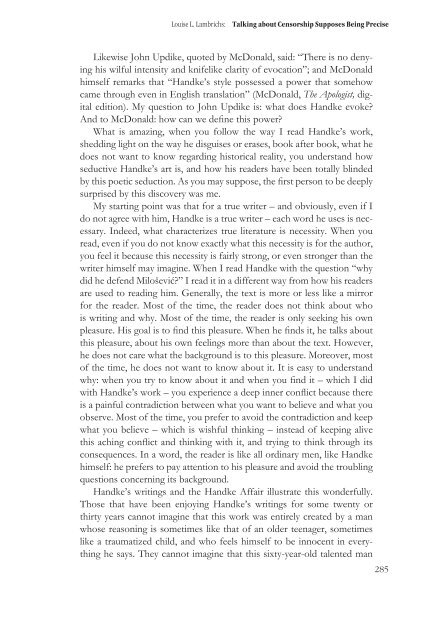Literatura in cenzura - Društvo za primerjalno književnost - ZRC SAZU
Literatura in cenzura - Društvo za primerjalno književnost - ZRC SAZU
Literatura in cenzura - Društvo za primerjalno književnost - ZRC SAZU
- No tags were found...
You also want an ePaper? Increase the reach of your titles
YUMPU automatically turns print PDFs into web optimized ePapers that Google loves.
Louise L. Lambrichs:Talk<strong>in</strong>g about Censorship Supposes Be<strong>in</strong>g PreciseLikewise John Updike, quoted by McDonald, said: “There is no deny<strong>in</strong>ghis wilful <strong>in</strong>tensity and knifelike clarity of evocation”; and McDonaldhimself remarks that “Handke’s style possessed a power that somehowcame through even <strong>in</strong> English translation” (McDonald, The Apologist, digitaledition). My question to John Updike is: what does Handke evoke?And to McDonald: how can we def<strong>in</strong>e this power?What is amaz<strong>in</strong>g, when you follow the way I read Handke’s work,shedd<strong>in</strong>g light on the way he disguises or erases, book after book, what hedoes not want to know regard<strong>in</strong>g historical reality, you understand howseductive Handke’s art is, and how his readers have been totally bl<strong>in</strong>dedby this poetic seduction. As you may suppose, the first person to be deeplysurprised by this discovery was me.My start<strong>in</strong>g po<strong>in</strong>t was that for a true writer – and obviously, even if Ido not agree with him, Handke is a true writer – each word he uses is necessary.Indeed, what characterizes true literature is necessity. When youread, even if you do not know exactly what this necessity is for the author,you feel it because this necessity is fairly strong, or even stronger than thewriter himself may imag<strong>in</strong>e. When I read Handke with the question “whydid he defend Milošević?” I read it <strong>in</strong> a different way from how his readersare used to read<strong>in</strong>g him. Generally, the text is more or less like a mirrorfor the reader. Most of the time, the reader does not th<strong>in</strong>k about whois writ<strong>in</strong>g and why. Most of the time, the reader is only seek<strong>in</strong>g his ownpleasure. His goal is to f<strong>in</strong>d this pleasure. When he f<strong>in</strong>ds it, he talks aboutthis pleasure, about his own feel<strong>in</strong>gs more than about the text. However,he does not care what the background is to this pleasure. Moreover, mostof the time, he does not want to know about it. It is easy to understandwhy: when you try to know about it and when you f<strong>in</strong>d it – which I didwith Handke’s work – you experience a deep <strong>in</strong>ner conflict because thereis a pa<strong>in</strong>ful contradiction between what you want to believe and what youobserve. Most of the time, you prefer to avoid the contradiction and keepwhat you believe – which is wishful th<strong>in</strong>k<strong>in</strong>g – <strong>in</strong>stead of keep<strong>in</strong>g alivethis ach<strong>in</strong>g conflict and th<strong>in</strong>k<strong>in</strong>g with it, and try<strong>in</strong>g to th<strong>in</strong>k through itsconsequences. In a word, the reader is like all ord<strong>in</strong>ary men, like Handkehimself: he prefers to pay attention to his pleasure and avoid the troubl<strong>in</strong>gquestions concern<strong>in</strong>g its background.Handke’s writ<strong>in</strong>gs and the Handke Affair illustrate this wonderfully.Those that have been enjoy<strong>in</strong>g Handke’s writ<strong>in</strong>gs for some twenty orthirty years cannot imag<strong>in</strong>e that this work was entirely created by a manwhose reason<strong>in</strong>g is sometimes like that of an older teenager, sometimeslike a traumatized child, and who feels himself to be <strong>in</strong>nocent <strong>in</strong> everyth<strong>in</strong>ghe says. They cannot imag<strong>in</strong>e that this sixty-year-old talented man285
















